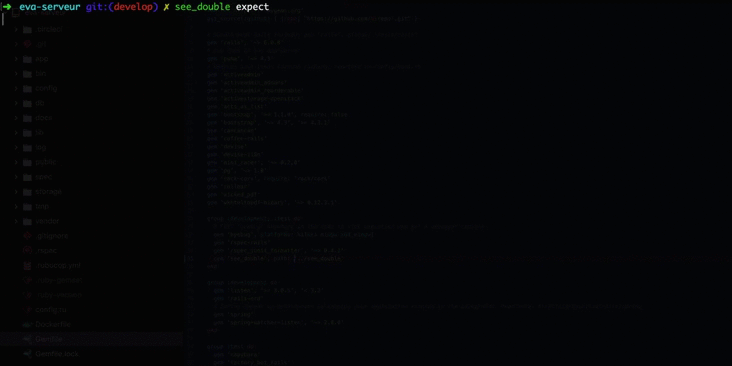A small tool CLI, for Rspec Lover, to monitoring your FEATURE specs and check your duplication. SeeDouble go through all your specs and count the number of occurence of your 'expect' and 'result'.
Add this line to your application's Gemfile:
gem 'see_double'And then execute:
$ bundle
Or install it yourself as:
$ gem install see_double
Just open you terminal, go in your project and type:
see_double expect or see_double result.
(if you are facing somme issue try to prepend bundle exec before the commands above)
An example is better than 1000 words so.. imagine you have written the following and beautiful test:
describe 'Car - Edit', type: :feature do
let!(:user) { create :user, email: 'customer@gmail.com' }
let!(:car) { create :car, brand: 'CoolCar', user: user }
scenario 'Edit a car' do
visit edit_car_path car
expect do
fill_in :car_brand, with: 'CoolCar XP'
click_on 'Update'
end.to_not change { Car.count }
expect(car.brand).to eq 'CoolCar'
expect(car.user.email).to eq 'customer@gmail.com'
expect(page).to have_content 'CoolCar'
expect(page).to have_content 'customer@gmail.com'
end
endIn your cli just type see_double expect and you will see something like that..
----- Analyze of your expect from each features specs -----
./spec/features/cars/edit_spec.rb:
you use 2 times page as expect
you use 1 times car.brand as expect
you use 1 times car.user.email as expectSeeDouble count the number of occurence of your 'expect'. Your result is sorted by file.
In your cli just type see_double result and you will see something like that..
----- Analyze of your result from each features specs -----
./spec/features/cars/edit_spec.rb:
you use 2 times 'CoolCar' as result
you use 2 times 'customer@gmail.com' as resultSeeDouble count the number of occurence of your 'result'. Your result is sorted by file.
Bug reports and pull requests are welcome on GitHub at https://github.com/morissetcl/conchiterz. This project is intended to be a safe, welcoming space for collaboration, and contributors are expected to adhere to the Contributor Covenant code of conduct.
The gem is available as open source under the terms of the MIT License.

